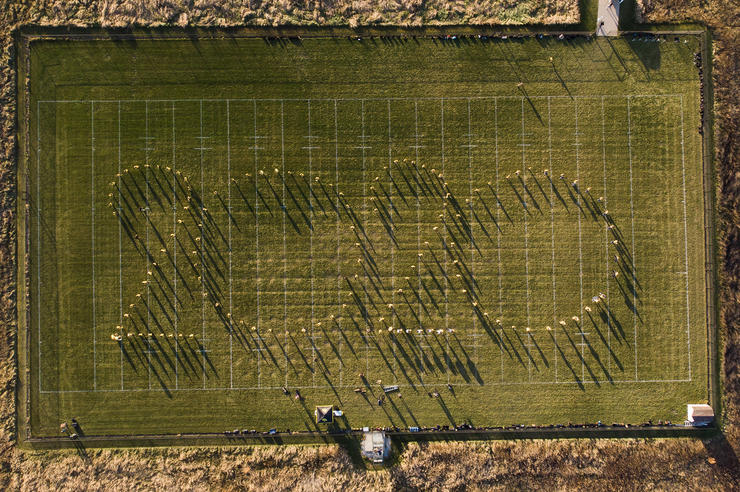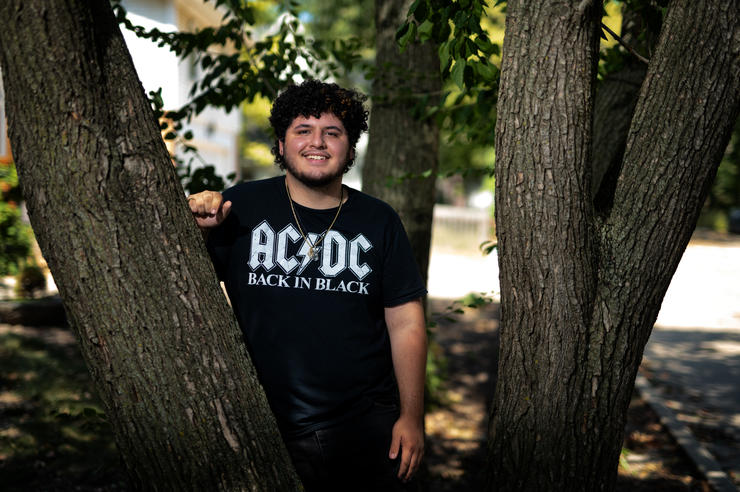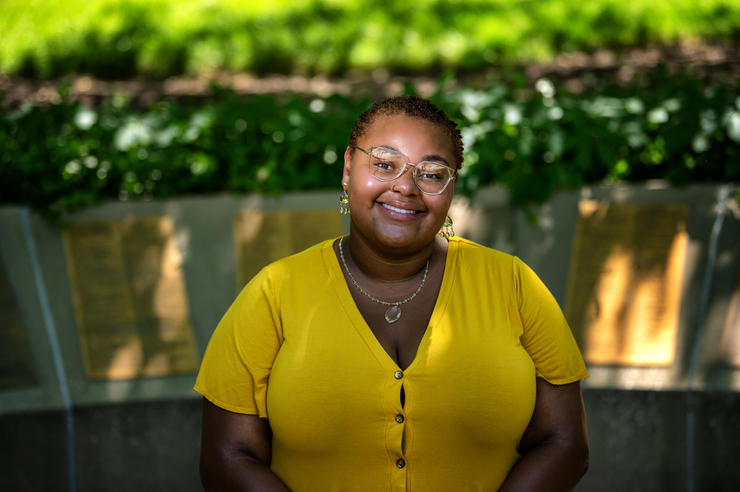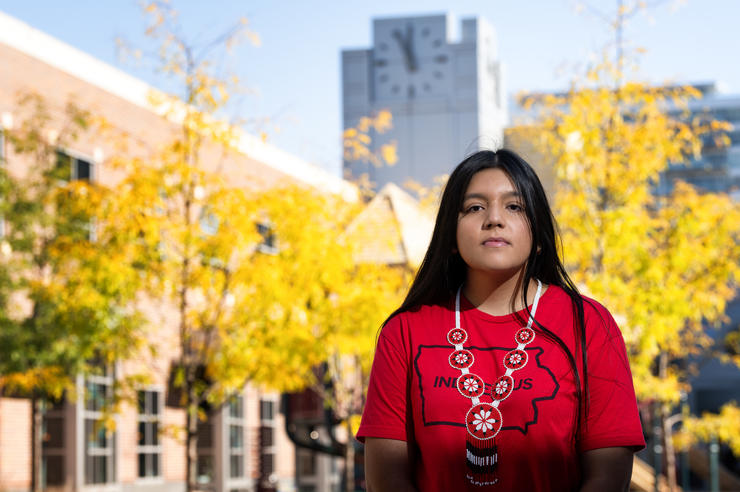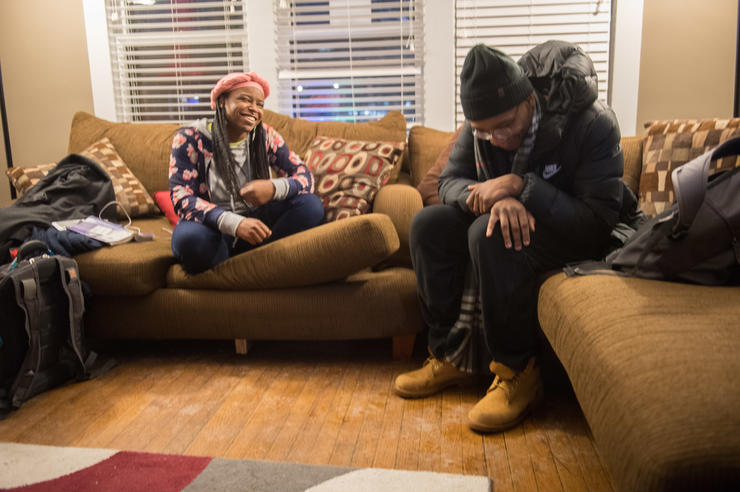Keeping community during COVID-19
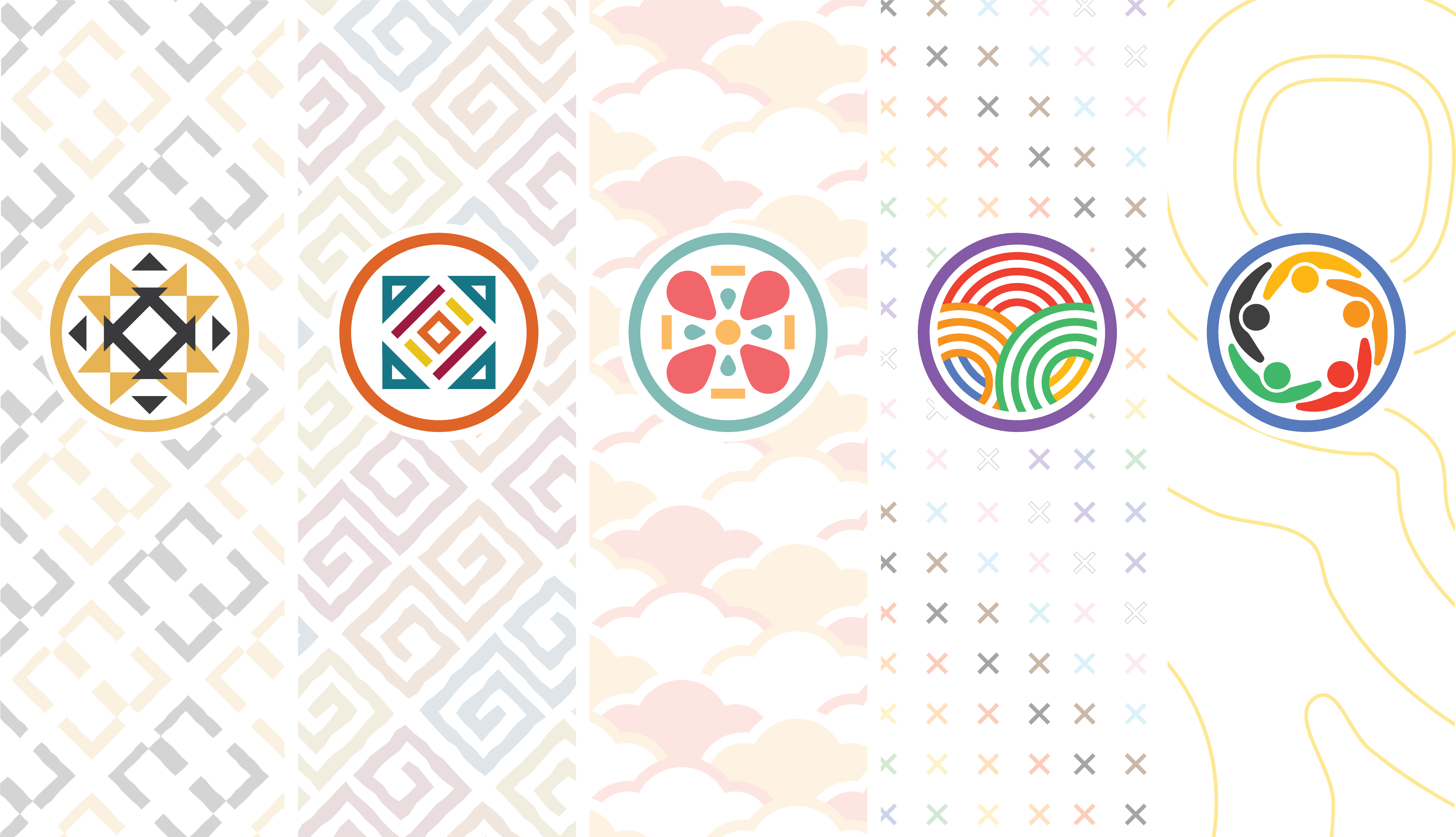
When your main pitch to students is that you provide a “home away from home,” what do you do when your physical space is unavailable due to a pandemic?
That has been one of the biggest challenges facing University of Iowa staff in Multicultural and International Student Support and Engagement (MISSE) as COVID-19 safety guidelines have kept its four cultural centers shuttered since March 2020. Coordinators in MISSE—comprised of the Afro-American Cultural Center (known as the Afro House), the Latino Native American Cultural Center (LNACC), the Asian Pacific American Cultural Center (APACC), the Pride Alliance Center (dubbed the Pride House), and International Student Support and Engagement (ISSE)—have banded together with staff to create virtual programming that is relevant to students. And that has required a lot of outside-the-box thinking.
The unique icons, patterns, and colors represent and acknowledge the heritage, history, and symbolism that resonate with each diverse group: (from left to right) the Afro-American Cultural Center, the Latino Native American Cultural Center, the Asian Pacific American Cultural Center, the Pride Alliance Center, and International Student Support and Engagement.
“How do we connect with students who have never heard of us before when we don’t have on-campus promotion opportunities? Everything has to be online. How do we even get the message to students to find us online—and then how do we get them to stay? How do we remain relevant and not facilitate burnout for students who are on Zoom all day for classes?” says Emma Welch, coordinator of the Pride House. “It’s important to us as a team to maintain the warm feeling we’ve developed over the years and transcend the sterility of being on the screen.”
Easier said than done, but coordinators like Welch and some 30 student staff members have been experimenting with different ideas for nearly a year. All the centers host Zoom “office hours,” when students are invited to log in to chat or just hang out, and most have utilized an online platform called Discord to create 24/7 channels of communication focusing on various interest areas. There have been virtual yoga classes, book clubs, game nights, and Instagram takeovers. The Afro House held a costume contest on social media for Halloween, complete with prizes, and also partnered with the Pride House and the UI Lecture Committee to host a talk with actress and LGBTQ+ advocate Laverne Cox. To kick off the spring 2021 semester, student leaders at the APACC wrote postcards to incoming first-year and transfer students to welcome them to campus and invite them to attend online events.
Although Iowa’s cultural centers remain closed to foot traffic, each multicultural area offers opportunities for students to interact with each other online and participate in virtual activities. Connect with them on social media:
Afro-American Cultural Center
- Facebook: @Afrohouseuiowa
- Instagram: @uiowaafrohouse
Latino Native American Cultural Center
- Facebook: @LNACCUIowa
- Instagram: @uiowalnacc
Asian Pacific American Cultural Center
- Facebook: @UIAPACC
- Instagram: @uiowaapacc
Pride Alliance Center
- Facebook: @uiowapridehouse
- Instagram: @uiowapridehouse
International Student Support and Engagement
- Instagram: @uiowaisse
“The pandemic has been very sad and intense and scary for so many, but there also has been a beautiful side to it, in that people are being creative and doing things they never thought they would have done before,” says Isabela Flores, interim LNACC coordinator.
One example she notes is Podémos Hablar?, a podcast created last fall by LNACC programming assistants Chris Vazquez, an English and creative writing major from Minneapolis, and Alex Escalada, a music major from Cedar Falls, Iowa. The pair teamed up to record three episodes during Latinx/a/o Heritage Month after the idea was floated at a staff brainstorming session. In the short series, they laugh and tease each other as they discuss what they’ve been watching lately while also hitting a more serious tone on identity-related topics like language and terminology and LGBTQ+ issues.
Escalada says the response to the podcast was unexpected.
“We thought it might fly under the radar, so we were pretty surprised when we received a lot of positive feedback after the first one. People suggested topics and wanted to be guests,” says Escalada, adding that he and Vazquez picked up new skills in the process by learning how to record and edit audio. “We wanted to give space for discussion of various topics and to provide different perspectives and for it to be a very natural and informal conversation. To hear that it was enjoyable and worthwhile for so many people really meant a lot to me.”
“Before COVID, we tended to measure success by attendance numbers or whether we had a packed house. But now I feel it’s not the number of people who show up that is important, it’s the quality of the program and the people who did show up and got something out of it. It’s more important that we connect with people.”
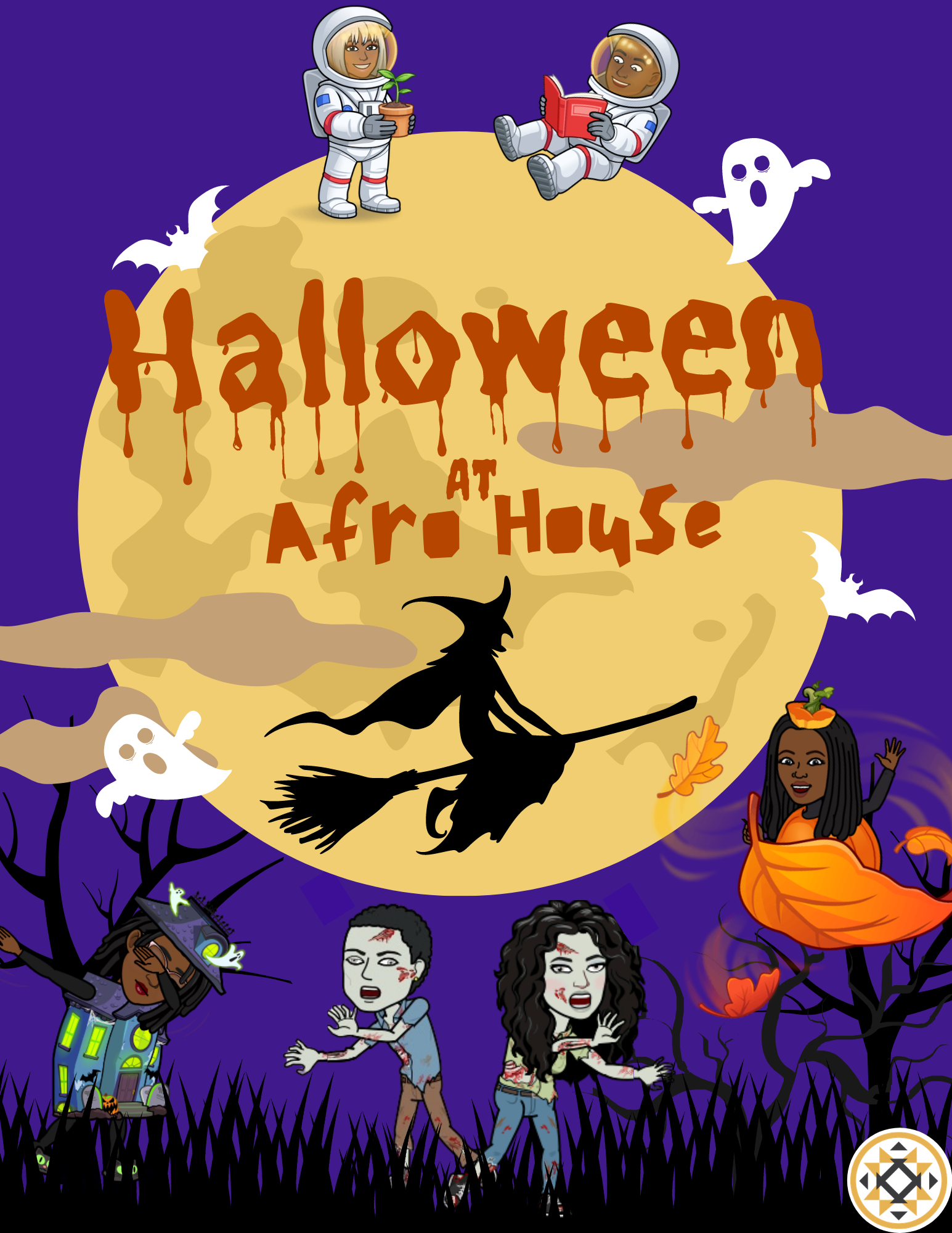
The cultural centers have organized virtual events throughout the pandemic. One example: The Afro House held a costume contest on social media for Halloween, complete with prizes.
Reimagining community
Doing the podcast shifted Escalada’s views on community connections.
“Before COVID, we tended to measure success by attendance numbers or whether we had a packed house. But now I feel it’s not the number of people who show up that is important, it’s the quality of the program and the people who did show up and got something out of it. It’s more important that we connect with people,” says Escalada, who hopes to produce more podcasts in the future. “I’ve also learned that it’s extremely valuable to build community as a staff. The podcast was just a conversation between two staff members, and I felt that doing it was a way for us to grow as friends and as coworkers. Community has lots of different forms.”
The pandemic has the coordinators rethinking community too—on campus and beyond. They facilitate a monthly Zoom gathering for their student staff called “MISSE Mingles,” in which the students pick the topics and lead the discussions. And they have been connecting with peers at other institutions, with whom they share ideas, best practices, and even suggestions for collaboration, says Flores.
“It would be easy to be siloed in this position and think only about the University of Iowa, but the circumstances have me considering how we might engage with others. Being able to connect with peers really expands our reach,” she says. “I find myself thinking, ‘Maybe I can connect with this person in California or New York and collaborate on a national event, perhaps creating a program that involves students from a whole bunch of different universities. That’s not something I ever would have thought of or imagined before.”
“We’ve created a virtual space on social media where we try to engage students through questionnaires, polls, and contests to actively remind people that the space is still there.”
Though eager to reopen the cultural centers for the students who rely on the space, Thomas Arce, interim associate director of MISSE, is pleased by one outcome of shifted operations.
“The connection between coordinators and student staff has always been there, but it has developed further during the pandemic,” Arce says. “Moving operations online has allowed us the time to work individually with student staff members and develop them as leaders, and then those students work with their friends and peers in various student clubs and organizations. It has a ripple effect.”
Samer Suleman can’t wait to set foot in the Afro House. The junior from Iowa City had never been inside the center when he was hired as a programming assistant last fall. But he says simply knowing it existed was comforting. Until it is safe to gather together again, he is determined to create that same sense of comfort for students online.
“We’ve created a virtual space on social media where we try to engage students through questionnaires, polls, and contests to actively remind people that the space is still there,” says the enterprise leadership and communication studies major. “I can’t wait to work inside the Afro House—opening it and locking up, seeing students come in and out, hosting events and setting up chairs, and doing things away from a screen. I’m looking forward to working in proximity with others again.”
